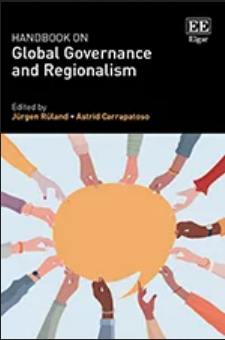New publication on the EU and ASEAN in global climate governance in "Handbook on Global Governance and Regionalism" (Lena Partzsch)
Climate governance is highly complex and challenging: All kinds of actors - international organizations, civil society organizations and networks, social movements, transnational corporations, cities, and many more – engage in climate change mitigation and adaptation at the global and regional level.
News from Dec 23, 2022
In the chapter “Global climate governance and the challenge of regional interplay: the case of the European Union and ASEAN”, Prof. Astrid Carrapatoso, Prof. Lena Partzsch und Dr. Anne Sacherer introduce the reader to major research strands of climate governance, thereby focusing on International Relations but highlighting the interdisciplinary nature of climate research. The authors outline the global climate change regime with the United Nations Framework Convention on Climate Change (UNFCCC) as the major international authority to set global rules which impact on but are also influenced by regional organizations like the European Union that often pursue their own agendas. In addition to the global-regional nexus, regional interplays matter for climate actions. We therefore present a case study on the EU Renewable Energy Directive (RED). The interaction between the EU and ASEAN is of particular importance and illustrate how the contested issue of palm oil not only impacts on EU-ASEAN relations but also on the sustainable development and climate change mitigation in both regions.
Carrapatoso, A., Partzsch, L., & Sacherer, A. (2022). "Global climate governance and the challenge of regional interplay: the case of the European Union and ASEAN". In n J. Ruland & A. Carrapatos: Handbook on global governance and regionalism . Cheltenham, UK: Edward Elgar Publishing. DOI: https://doi.org/10.4337/9781800377561.00038.
